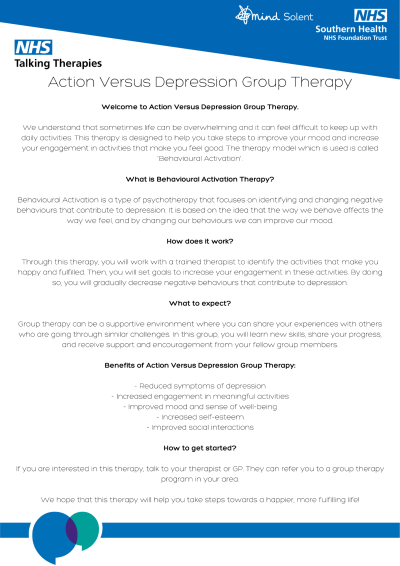How We Help
Specialist Therapies
Our practitioners deliver a range of evidence-based treatments, tailored to the individual patient and your goals for recovery.
If you feel one of our talking therapies could be helpful for you, click the button below to refer yourself to our service and arrange your assessment.
The treatments we use include:
Cognitive Behavioural Therapy (CBT)
Delivered individually or in groups, CBT empowers patients to identify the "vicious cycles" that keep them from feeling better. Patients learn practical skills to break free of these cycles to reduce their symptoms of depression or anxiety.
Interpersonal Therapy (IPT)
An individual treatment looking at how a person's relationship with others, or their own identity, impacts their mental health. IPT enables people to improve these relationships to reduce their symptoms of depression.
Cognitive Analytic Therapy (CAT)
CAT enables patients to identify where patterns of behaviour developed to cope with difficult experiences may be affecting their life now. A trusting relationship with the practitioner helps people to explore ways of doing things differently.
Comprehend, Cope and Connect
Developed in-house, this treatment enables patients to understand the root of their problems and find healthier coping strategies through peer support.
Couples Therapy for Depression
A treatment supporting couples affected by one partner's depression, to facilitate more open communication and help both partners understand how to support each other.
Compassion Based Therapy
A group treatment focussed on alleviating feelings of threat or shame, through building compassion for ourselves and others.
Transdiagnostic Group
A group therapy for people with an anxiety disorder or depression, to learn more positive ways to respond to their emotions.
Mindfulness Based Cognitive Therapy (MBCT)
A group therapy teaching mindfulness and meditation practices to empower people to maintain their recovery from depression, where they are currently well but have experienced patterns of relapse and recovery before.
EMDR
Using bilateral stimulation through eye movement to help people to resolve and recover from distressing experiences or events, and reduce symptoms such as flashbacks, fear or shame.
Counselling for Depression
A treatment supporting people to express unresolved feelings, explore and make sense of them and develop new ways of looking at things, to improve symptoms of depression.
For more information about Cognitive Behavioural Therapy (CBT) watch our explainer video below!
Action Versus Depression Group Therapy (Solent Mind)
- Eight-week session program
- Each session lasts 1.5 hours
- Daytime and evening groups will be available.
- Groups are run Face to Face / online via Zoom across all localities, service wide.
- Session slides will be sent in advance,
- The group will have up to 15 participants.

 Menu
Menu


